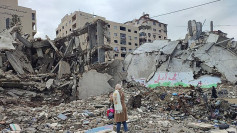South Korea announced on Wednesday that it would increase COVID-19 testing at schools in response to a high surge in infections among students, just weeks before it plans to completely reopen all of the country's schools.
The increase coincides with the implementation of new social distancing laws aimed at a progressive return to normalcy, which took effect on Monday as part of the country's strategy to gradually transition to living with COVID-19 as a result of the country's high vaccination rates.
South Korea has fully vaccinated nearly 90% of its adult population, but has just recently begun immunizing children aged 12 to 17 years old, with only 0.6% of this age group receiving both doses of the vaccine so far.
In a statement, Interior and Safety Minister Jeon Hae-cheol said, "There is rising concern as the frequency of new cluster outbreaks has increased, particularly in educational facilities such as private tuition centers and schools."
South Korea aims to reopen all of its schools on November 22, beginning with the most remote areas.
Hae-cheol stated that the government would increase the use of portable polymerase chain reaction (PCR) diagnostic testing for COVID-19 in schools in Seoul and neighboring regions, as well as mobilize additional virus-prevention workers in overcrowded schools, in order to combat the outbreak.
There were 2,667 new infections reported in the country on Tuesday, representing a rise of more than 1,000 cases from the previous day. Health officials said teens were responsible for about one-fourth of the new increase in illnesses.
In a briefing, Son Young-rae, a senior health ministry official, said that teens spend a significant amount of time in communal living environments like schools and tuition centers, and that they are also involved in social activities.
The country has not experienced a significant increase in the number of very ill cases among teenagers, with only one out of every 378 severe COVID-19 patients receiving hospital treatment.
A series of Pfizer/BioNTech vaccines was administered to children between the ages of 12 and 17.
"We believe that the risk of infection will surely increase, and that the number of confirmed cases will continue to rise as a result of the presence of these adolescents," Young-rae said in quotes by Reuters.
South Korea has also reported a remarkably low death rate of 0.78%, which is lower than the global average.






